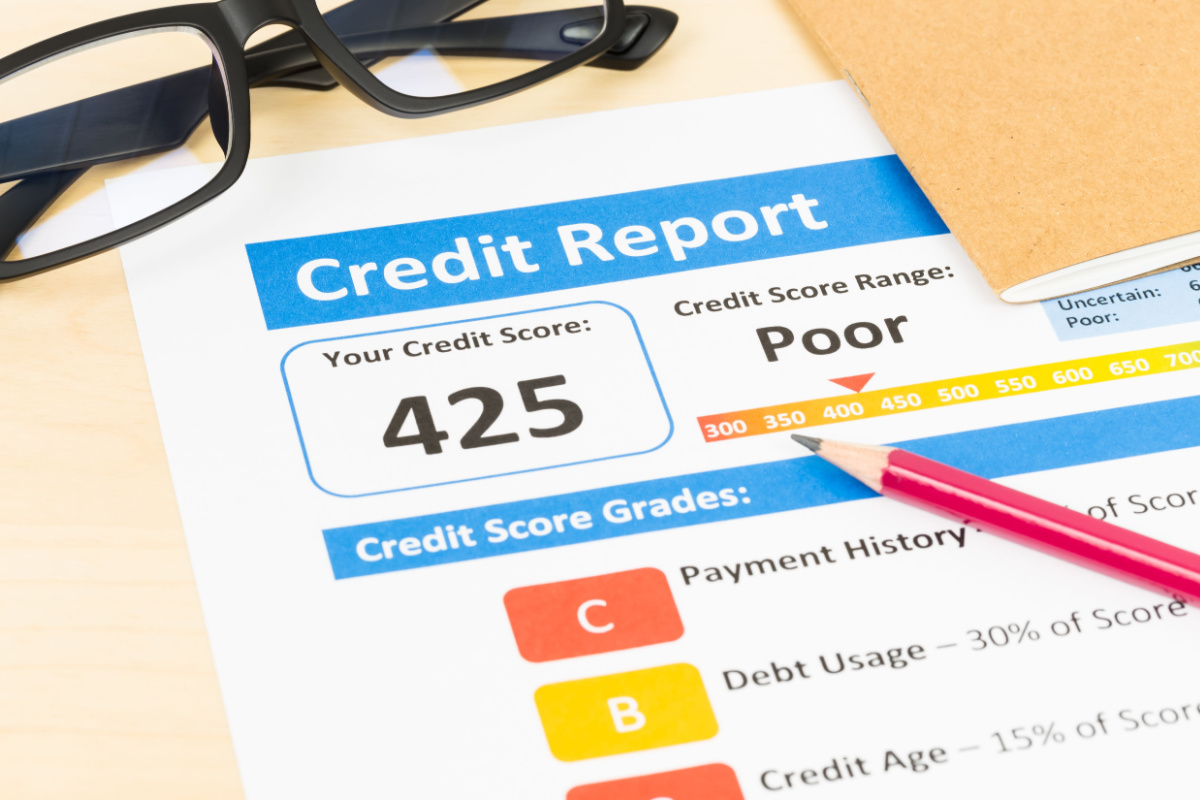Need a Loan Now but Keep Getting Refused?
Feeling frustrated because you need a loan and keep getting turned down? Trust me, you're not the only one. It's a tough spot, and it's easy to feel stuck.
But here's some good news: This blog is about turning things around. We're going to break down the reasons you might be getting declined and give you actionable advice to improve your chances.
From diving into loan denial reasons to tips on improving your credit, we've got you covered. Ready to make a change? Let's dive in.
Why Can’t I Get a Loan: 5 Common Reasons Why Your Personal Loan Was Declined
Receiving a loan rejection can happen for several reasons, and it occurs more often than you might think. In 2023, around 20% of applicants reported receiving rejections after applying for credit.

Understanding the reasons behind loan denials can help improve your chances of approval in the future.
1. Bad Credit History
If you need a loan but keep getting declined, it's essential to understand the reasons behind these rejections. Perhaps the most common reason that a lender might not extend a payday loan to a potential client has to do with one's credit score. Lenders check your credit history to determine if you can repay the loan and the risk involved in lending you money.
If you've experienced late payments, defaults, or bankruptcies, it's likely that your credit score has been impacted. This might cause lenders to be cautious and consider you a higher-risk borrower. As a result, you may find it challenging to secure a loan, and even if you do, you may be offered less favorable terms and higher interest rates.
But what should you do if you find yourself with too low of a credit score to take out a payday loan? In most cases, you may be able to qualify with a co-signer. Working with someone who has a slightly higher credit score might help you to get a loan, especially if you have a very low score.
If you don't have a good co-signer available, you might need to look into loans that will allow you to offer collateral for a secured loan. Lenders that offer secured loans may cater to borrowers with lower credit scores.
2. High Debt-to-Income Ratio
One common reason why people get denied loans is a high debt-to-income ratio. Your debt-to-income ratio is how much debt you have compared to how much money you make. It's typically expressed as a percentage, and lenders use it to determine how much debt you can handle.
To calculate your DTI, add all your monthly debt payments (including credit card bills, car loans, and student loans) and divide that by your gross monthly income (your income before taxes and other deductions are taken out). Then, you multiply that number by 100 to get your DTI percentage.
Lenders use this ratio to determine how much debt you can afford and whether you're a risky borrower. A high debt-to-income ratio means you're using a significant portion of your income to pay off debt. As a result, you may need more left over to cover new loan payments.
3. Unstable Employment History
People with unstable employment histories often find themselves in situations where they need a loan but keep getting declined. This is because lenders typically look for stable employment as a sign that you have a reliable source of income and are more likely to repay your loan.
If you've had a lot of job changes, gaps in your employment, or a history of being laid off, lenders may consider you a risky borrower and deny your loan application.
4. Minimum Income Requirement Not Met
Lenders typically require that borrowers meet certain income requirements to repay the loan. If an individual's income does not meet the lender's minimum requirement, the lender may consider them a higher-risk borrower and may decline their loan application.
Generally, most lenders require borrowers to have a minimum annual income of $20,000 to $30,000 to qualify for a personal loan.
However, the minimum annual income requirement can vary by lender, loan type, and the amount you request.
5. Missing Information or Paperwork
Another reason people are commonly declined for loans is missing information or paperwork. When applying for a loan, lenders typically require certain information and documents to assess your creditworthiness and ability to repay the loan.
The lender may only accept your application if you provide all the required information or paperwork.
You must provide proof of income, bank statements, and tax returns when applying for a loan. Lenders may also require personal documents like a valid ID, Social Security number, and proof of residency.
Missing or incomplete financial and personal information can make it difficult for the lender to evaluate your application. As a result, it may result in a denial.
Actions to Take if You Were Declined for a Personal Loan
It can be discouraging and frustrating if you keep getting denied for payday loans, especially when you need the funds urgently.

But you can take steps to increase your chances of loan approval in the future. We’ve highlighted five of them below.
Review Your Decline Notice
If you've been declined for a personal loan, the first step you should take is to review your decline notice. Most lenders will provide a reason for the decline, which can help you understand why your application was rejected.
The reasons will likely include the ones mentioned in the previous section. Once you receive your decline notice with the reason for the rejection, you can take the following steps to address the issue and improve your likelihood of future loan approval.
Review Your Credit Report and Boost Your Credit Score
If your credit score contributed to your loan application being declined, request a copy of your credit report and review it for inaccuracies. Your credit report contains information about your credit history, including your payment history, outstanding debts, and any accounts in collections.
You can get a free annual credit report from Equifax, Experian, and TransUnion. You can obtain them by visiting AnnualCreditReport.com.
Once you have obtained your credit reports, please review them carefully to ensure that all of the information is accurate and up to date. You can file a dispute with the credit reporting agency if any information needs to be corrected.
If the agency confirms the information is inaccurate, the information will be removed, and your report will be updated accordingly. It would be best to wait several months until the inaccurate information is removed and your score improves before applying for a loan again.
However, if inaccurate information isn’t the reason for your low score, there are steps you can take to improve your score. Here are a few ways to boost your credit score:
- Pay your bills on time: Arrange automatic payments or use reminders to assist you in keeping track of your bills. Consider creating a budget to ensure you have enough money to cover your monthly expenses.
- Reduce your credit card balances: Consider using the debt avalanche or snowball strategy to reduce your credit card balance. These approaches involve focusing on either your highest-interest debts or your smallest debts for repayment.
- Limit new credit applications: Wait at least six months between credit card or loan applications to avoid negatively impacting your credit score.
- Monitor your credit report: Check your credit report regularly for errors or inaccuracies and dispute any mistakes with the credit reporting agency.
- Apply for a secured credit card: A secured credit card could be an alternative to help you build credit over time. These cards require a security deposit that serves as collateral. The issuer will report your payments to the credit bureaus. Timely payments can reflect positively on your credit report and help improve your score. While secured cards may have lower credit limits, the benefits of building your credit may outweigh the limits.
Find a Co-signer
If your credit score or income is below the lender’s minimum requirement, consider getting a co-signer to help improve your approval chances.
A co-signer is someone with good credit and income who agrees to repay the loan if you cannot. A co-signer with good credit and a high income can increase the likelihood of getting approved for a loan. A co-signer can assure the lender that the loan will be repaid.
When you apply for a loan with a co-signer, the lender will evaluate your and your co-signer's creditworthiness and income to determine eligibility. If the co-signer has a good credit score and a stable income, it can help offset any potential weaknesses in your credit or income.
When looking for a co-signer, choose someone who has a good credit history, a stable income, and is willing and able to take on the responsibility of co-signing the loan. If you cannot, this person will be equally responsible for repaying the loan. So it would be best to choose someone you trust and who is financially stable.
Remember that if you cannot make your loan payments, your credit score and the co-signer's credit score will be negatively affected. The co-signer is automatically responsible for repaying the loan if you cannot.
If the loan defaults, collections can go after both individuals, and the debt will stay on your credit reports for about seven years.
Apply for a Smaller Loan Amount
If your loan application was declined because of a high DTI or insufficient income, consider applying for a smaller loan amount. Before submitting a new application, carefully review your budget and repayment capabilities.
First, track your income and expenses for one month. This will give you an idea of where your money is going. Next, categorize your spending into needs, wants, and savings. Try using a budgeting app or a simple spreadsheet for this.
Once you have a clear picture of your spending, consider discretionary areas where you can reduce spending. Sometimes, you may no longer need to apply for a loan if you free up enough extra money.
But, if you still need a little extra boost, opting for a smaller loan amount could improve your chances of getting approved. Making timely payments on a smaller loan can also help improve your credit history and score.
Shop Around
When you need a loan but keep getting refused, it could be because you don’t meet the lender’s eligibility requirements. Consider shopping around and applying with other lenders to increase your chances of approval.
Different lenders have different criteria for loans, so it's worth comparing rates, terms, and requirements from multiple providers. Look for lenders that are willing to work with your credit profile. Or search for lenders that offer alternative options, such as secured loans.
Before applying for a loan, check the lender's eligibility criteria to ensure you meet their requirements. Hard credit checks negatively impact your credit score, so be selective with your applications and only apply for loans that align with your repayment and budgeting abilities.
Wait and Reapply
If your loan was denied because of missing or incomplete information, don’t immediately reapply. Too many loan applications in a short period can negatively impact your credit score.
If possible, wait at least 30 days before submitting another application. This time, check the lender’s requirements and prepare all your financial and personal documents beforehand.
Also, ask the lender if additional information is needed. Sometimes, the lender may ask for more documents to determine your eligibility.
FAQ
Let’s take a look at some frequently asked questions regarding loan denials.
How Long Should I Wait to Reapply for a Loan After Being Declined?
The time you should wait to apply after your loan application was declined depends on the reason for the denial and the lender's specific policies.
Generally, waiting at least 30 days before reapplying for a loan is best. This gives you time to address any issues that led to the denial, such as paying down debt or improving your credit score.
However, if you were denied due to a significant issue such as bankruptcy or foreclosure, you may need to wait longer before reapplying.
Additionally, if a specific lender denied you, consider applying with another lender with different underwriting criteria.
What Are the Differences Between Secured and Unsecured Loans?
Secured loans and unsecured loans are two types of loans available to borrowers. The main difference between these loans is whether collateral is required. A secured loan requires collateral. An unsecured loan does not.
Here are some more differences between the two:
- Collateral: A secured loan is backed by collateral, which is a valuable asset such as a car, house, or other property that you own. If you don't repay the loan, the lender can take the collateral to compensate for their loss. In contrast, you don’t risk losing any assets with an unsecured loan.
- Interest rates: Secured loans may have lower interest rates because they are backed by collateral. Lenders see secured loans as less risky because they have collateral to fall back on if the borrower defaults. Unsecured loans are considered riskier and often come with higher interest rates.
- Loan amount: Secured loans typically offer higher loan amounts because of the presence of collateral. Lenders may be more willing to provide larger amounts because they have the security of the collateral. Unsecured loans usually have lower loan amounts.
- Credit score: Because secured loans require collateral, lenders may be more lenient on credit requirements. However, if you have bad credit, you may need to put up more collateral to secure the loan. On the other hand, unsecured loans often require a good credit score to qualify.
- Repayment terms: Secured loans typically come with longer repayment terms than unsecured loans. Unsecured loans usually come with shorter repayment terms.
Final Thoughts
You're not alone if you've been struggling to get approved for a loan. If you need a loan but keep getting declined, you can take proactive steps to boost your likelihood of approval.
These include checking your credit report and working to improve your credit score, ensuring you meet the lender's minimum income requirements, and providing all the necessary information and paperwork.





